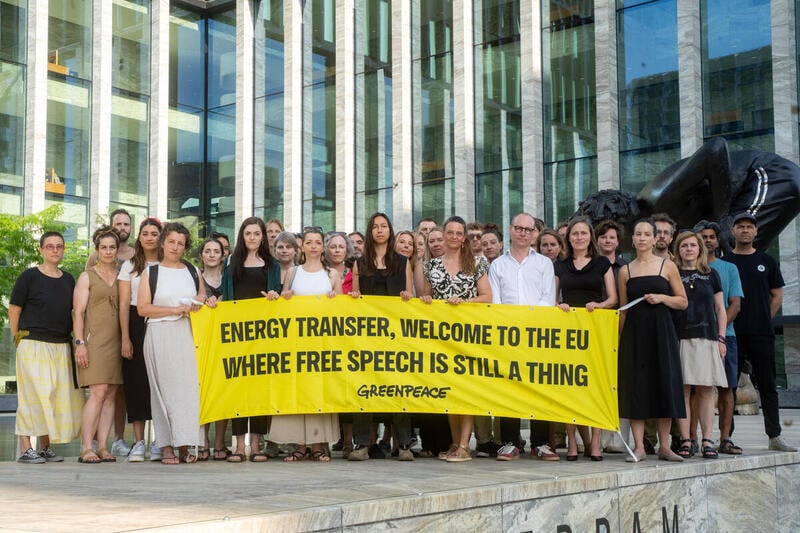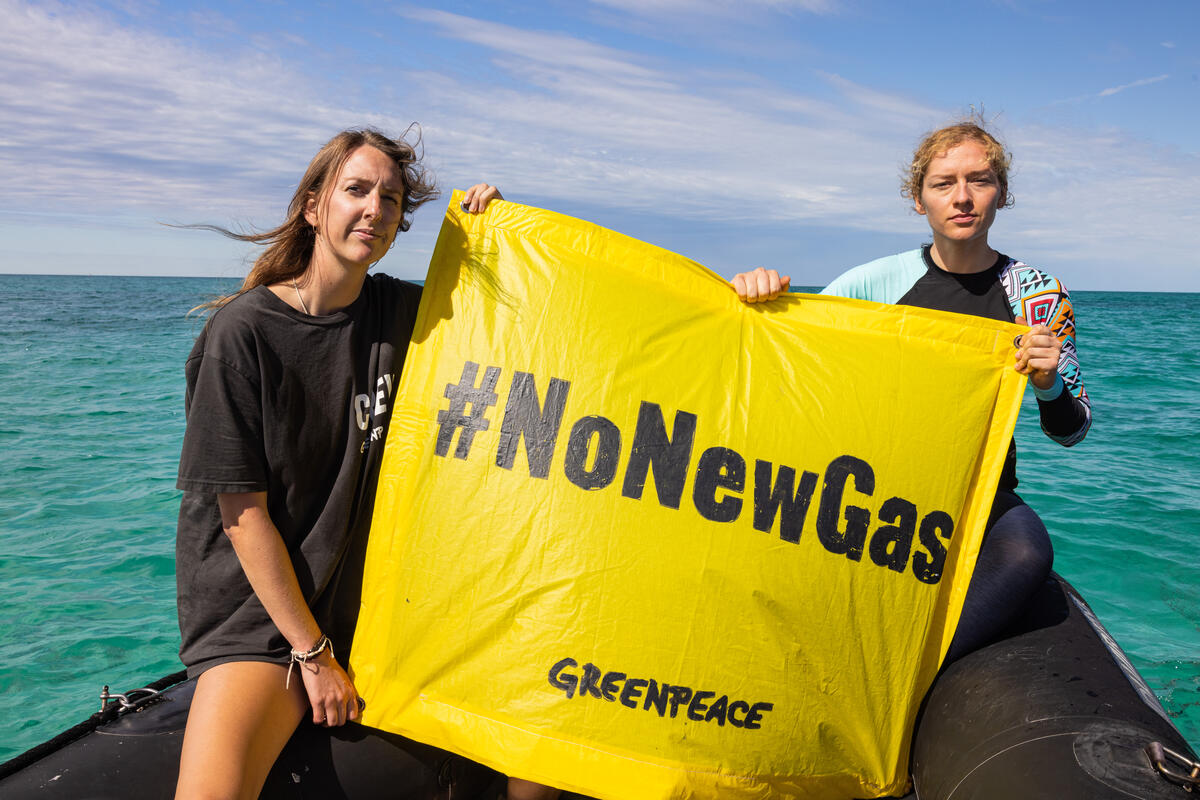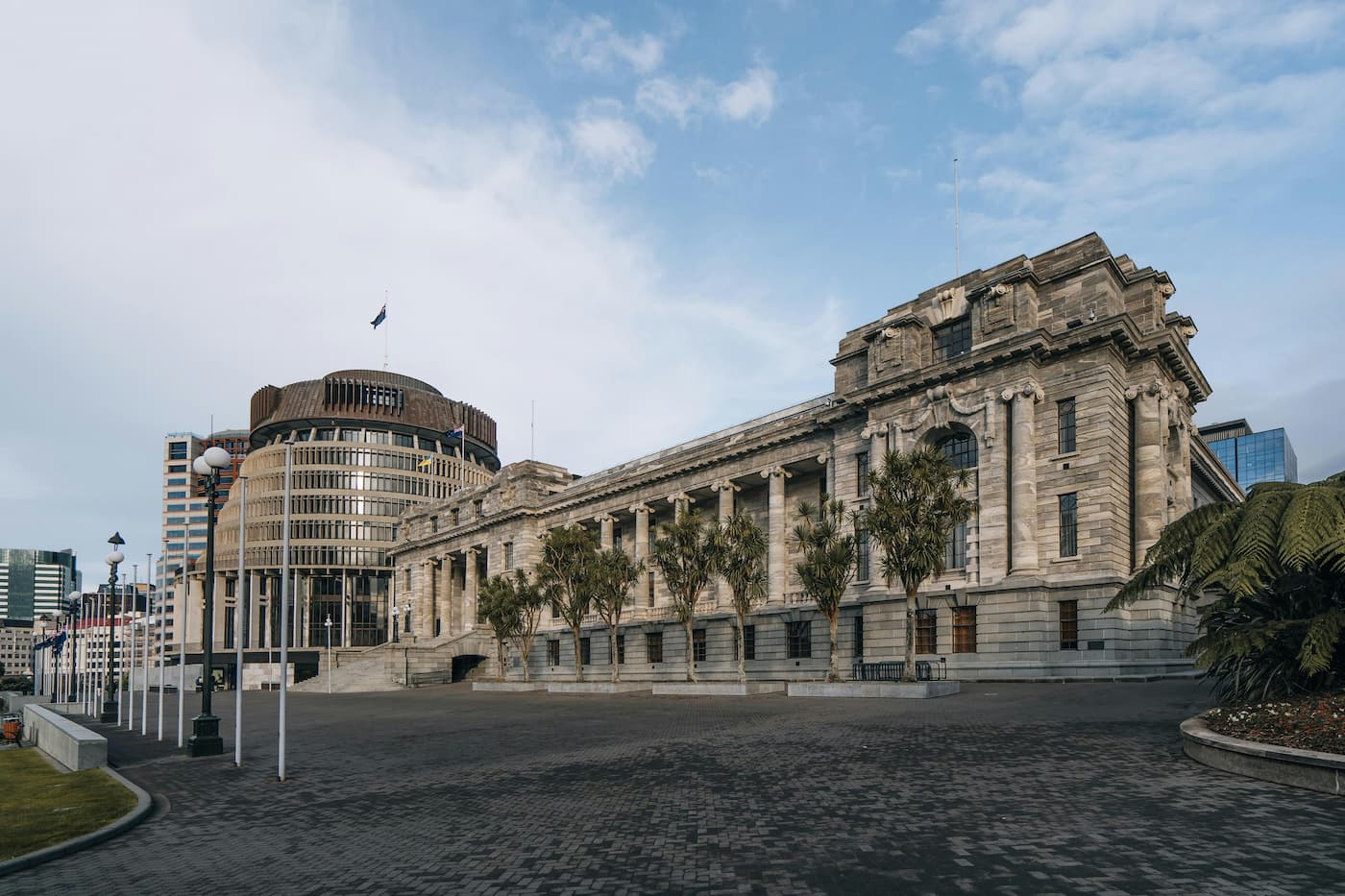
The sun is setting on the oil industry.
Around the world, people are standing up against the fossil fuel industry and calling for big changes to solve the climate emergency. We urgently need more sustainable and equitable ways of powering our societies and maintaining prosperous economies.
Greenpeace is working alongside local communities in multiple countries to achieve a world beyond oil. (And not just oil: we’re working in Poland and South Africa, for example, to call for a phase out of dirty coal, too).
Taking on the very powerful fossil fuel industry is no easy task. Just 100 companies have been the source of more than 70% of the world’s greenhouse gas emissions since 1988. For them, the stakes are high. But with the United Nations warning us that the world is headed for a catastrophic 3-5 degrees Celsius of planetary warming if current trends continue, we’re rising to the challenge with millions more people around the globe.
Here’s a whirlwind tour of some of the places Greenpeace offices and their supporters are taking action on a transition from oil to clean energy.
The Philippines

(L) Fred De la Cruz, a fisherman from the climate-impacted community of Bataan protests in front of Shell’s Manila HQ. (R) Activist Batangas drop a banner at the refinery of fossil fuel giant Shell, south of Manila. © Greenpeace
Communities in the Philippines are challenging fossil fuel companies to show accountability for their role in the climate crisis. In September, Greenpeace activists and representatives from climate-impacted communities blockaded a Shell refinery in Batangas City. Filipinos have also successfully petitioned the Philippines’ Commission on Human Rights to launch a landmark investigation into 47 major fossil fuel producers’ responsibility for climate-related human rights abuses following 2013’s Typhoon Yolanda (Haiyan), which claimed the lives of more than 6,300 people and affected millions more. The results of the investigation (which names Canadian producers), are expected later this year.
The United States

Twenty-two Greenpeace USA climbers form a blockade preventing the transport of all oil and gas through the Houston Ship Channel, home to the largest petrochemical complex in the United States. Their action is a call to the country’s present and future leaders to imagine a world beyond fossil fuels and embrace a just transition to renewable energy. © Greenpeace
Greenpeace USA is campaigning for a Green New Deal, which includes a just transition to renewable energy, creating millions of green jobs and halting any major oil, gas, and coal expansion projects. Taking action alongside grassroots groups south of the colonial border, Greenpeace has opposed new pipelines, blocked the largest fossil fuel thoroughfare in the country, and stood up against unjust, anti-protest laws pushed forward by oil companies. These kinds of laws disproportionately affect Black, Brown, Indigenous, trans, and queer people.
Australia

Leafy Seadragon (Phycodurus eques) at Kangaroo Island in the Great Australian Bight during the Making Oil History Rainbow Warrior Tour. © Richard Robinson / Greenpeace
Greenpeace Australia is campaigning to defend the Great Australian Bight, an area off Australia’s southern coast where Norwegian company Equinor has set sights on drilling for oil. The Bight is a breeding ground for endangered southern right whales and contains the Great Southern Reef, 85% of whose animals can’t be found anywhere else in the world. Exploratory seismic blasting was suspended in August and respected Elders and Nobel Laureates have called on Australia’s government to place a permanent ban on oil exploration in the area. Hundreds of thousands of people have written to Australia’s government and to Equinor to say the project will never get their blessing to drill in this treasured oceanscape.
Brazil and French Guiana

Volunteers from many Brazilian cities held activities with giant puzzles on January 28th. The Amazon Reef is threatened by oil companies that want to drill near their location. © Kamila Oliveira / Greenpeace
When an incredible reef was discovered at the mouth of the Amazon River between Brazil and French Guiana, it was clear to us that it had to be protected. French company Total was interested in drilling for oil, but two million people took action and Brazil’s government denied Total’s license. But now, even after this historic win, another oil company (BP) wants to open up a new oil frontier in the region and the new Brazilian government has said it’s “not impossible” for BP to get a drilling license. Greenpeace is campaigning to protect the reef from oil development.
Germany

Under the motto “Get out of the Combustion Engine – Traffic Turnaround Now!” more than 20.000 people protested in Frankfurt, calling for a change in transportation policies to align with the Paris Agreement. The demonstration was organized by the alliance #aussteigen including the NGOs ADFC, BUND, Campact, Deutsche Umwelthilfe, Greenpeace, NaturFreunde Deutschlands and VCD. © Kevin McElvaney / Greenpeace
In Frankfurt, at the International Motor Show in September, Greenpeace Germany worked with other environmental and sustainable transport groups to organize a massive protest against the internal combustion engine. About 25,000 people participated (including 18,000 on bikes!), highlighting the role of the car industry in driving the climate emergency, including by lobbying against regulation . In the European, Greenpeace is calling on automakers to phase out diesel and gas cars by 2028 and for governments to invest in renewable-powered public transport, walking and cycling infrastructure.
Russia

Fyodor Moldanov, an Indigenous Numto community member, is against oil drilling on the wetlands of Numto, near his home and reindeer pastures. © Daria Karetnikova / Greenpeace
In Russia, Greenpeace is supporting Indigenous communities opposed to the impact of oil development on their livelihoods and culture. The majority of the Nenets and Khanty people in Siberia were not properly consulted when Russian oil company Surgutneftegas made plans to drill in the wetlands of the village of Numto, where many among the reindeer-herding Indigenous communities oppose the project. For the Khanty, oil extraction means wrecking the environment: heavy vehicles destroying land, which is difficult to recover in the Arctic, possible oil spills poisoning water and fewer places for the reindeer to feed on plants or wild herbs.
Canada’s tar sands
The impacts of the tar sands are globally significant, which is why we campaign on them. According to a study of 50 countries conducted by Stanford University , for example, Canadian oil is the fourth-most greenhouse gas (GHG) intensive in the world.
Activists from countries like the UK, Switzerland, Spain and more have asked financial institutions in their countries to stop funding harmful oil pipelines, including those that would expand the tar sands.
The tar sands are also the fastest-growing source of emissions in Canada (according to Environment Canada’s GHG Inventory ), making them one of the main reasons our country is off-track to meet its international climate targets.
Simply making oil development a little more efficient won’t cut it.
And since Canada is the ninth-biggest overall emitter of GHG emissions, we have a lot of work to do. This also gives us an opportunity to innovate on building a sustainable energy economy and to show leadership on the world stage by modelling climate ambition and encouraging other big polluters to do the same.
And of course…New Zealand

Greenpeace climbers scale the side of Wellington’s tallest building, the Majestic Centre, to deliver a message to oil giant OMV. © Jason Blair / Greenpeace
Although here in Aotearoa we led the world with our 2018 ban on new offshore oil and gas exploration permits, it didn’t revoke permits that were released before the ban. Austrian oil giant OMV holds many of these permits, and the company is the last international oil giant left. It has high risk drilling plans this summer in some of the country’s most pristine waters, which are alive with a multitude of rare and endangered species, including dolphins, whales, penguins, albatross, seals and sea lions. In New Zealand, the climate emergency driven by companies like OMV is threatening the livelihoods of coastal communities, customary indigenous owners, delicate marine ecosystems, and the precious wildlife that lives in those waters.
Join us to call on the New Zealand Government to Make Oil History, once and for all!

Almost 100 people gather outside Austrian oil giant OMV’s New Zealand headquarters to serve an eviction notice signed by more than 30,000 people. © Marty Melville / Greenpeace



